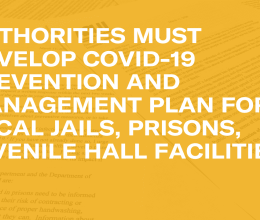By Novella Coleman
As stories of state violence against Black men and boys occupy many of the calls for police reform, countless stories of Black women and girls subjected to excessive force and police misconduct remain untold. We must say their names.
On March 28, 2015, 26-year-old Meagan Hockaday, a mother of three, was fatally shot by an Oxnard police officer responding to a reported domestic dispute. The officer fired four shots within 20 seconds of entering the apartment.
Say her name.
In July 2015, 51-year-old Marlene Pinnock was repeatedly punched by a California Highway Patrol officer on the side of a freeway. The incident was caught on video.
Say her name.
On May 19, 2016, 29-year-old Jessica Williams, was fatally shot by a San Francisco Police Department sergeant, who was attempting to prevent her from fleeing in a reportedly stolen car.
Say her name.
On June 18, 2017, 19-year-old Tatyana Hargrove was stopped by Bakersfield police officers who mistook her for a 25- to 30-year-old Black male suspected of threatening people with a machete at a nearby grocery store. The officers punched her in the mouth, unleashed a K-9 dog on her, and arrested her. They did not realize she was not the person they were looking for until after they placed her in their car.
Say her name.
On April 30, 2018, Kelly Fyffe-Marshall, Donisha Pendergast, and Komi-Oluwa Olafimihan were confronted with seven Rialto police cars and a helicopter as they were checking out of their Airbnb.
Say their names.
In 2013, “Jane Roe,” a transgender woman in Southern California accused a police officer of raping her after stopping her when she was walking to her friend’s house.
Say her name.
When we erase these experiences from our collective consciousness, we cannot fully grasp the depth of the problem nor the urgent need for reforms that are inclusive and responsive to the experiences of Black women.
Nationwide, Black women are more likely to be have been unarmed when killed by police than non-Black victims. According to another study by the Cato Institute, sexual violence perpetrated by police is the second most frequently reported form of police misconduct. In California, the U.S. Transgender Survey reports that over half of survey respondents who interacted with police or other law enforcement officers who thought or knew they were transgender experienced some form of mistreatment, including verbal harassment, physical assault, and sexual assault.
For too long, law enforcement officers in this country have unnecessarily subjected Black women and girls to countless forms of violence and misconduct, yet society as a whole doesn’t place the same emphasis on it as it does on other forms of police violence and misconduct.
We need to address this crisis. But one of the greatest obstacles to addressing police violence, misconduct, and harassment towards Black women in California is current state law. Right now, California police officers can kill people even if alternatives to deadly force are available, and police misconduct records are almost entirely shielded from public view. The result? Officers continue to mistreat and abuse Californians, but it is nearly impossible to hold them accountable when state law shields internal investigations into their misconduct and uses of force, while at the same time giving them legal cover to kill even when they could have pursued alternatives.
Fortunately, the California legislature can begin addressing both obstacles by passing two important bills this year.
SB 1421 will increase police transparency and accountability by restoring the public’s right to access records of confirmed police misconduct, such as sexual assault and dishonesty, as well as investigations of deadly and serious uses of force.
The second bill, AB 931, will change the standard authorizing deadly force to match best practices already in place at some departments – and that we know work to reduce police killings. Specifically, the bill clarifies that law enforcement should never kill when alternatives to deadly force exist. If passed, this bill could save the lives of Black women like Meagan Hockaday and Jessica Williams by emphasizing that officers prioritize the de-escalation of situations before they turn deadly.
We’ve reached a tipping point. Enough is enough. We call on the California Legislature to pass both measures now to keep Californians – especially Black women and girls – safe from police violence, abuse, and harassment. Our communities cannot wait any longer.
Novella Coleman is a Staff Attorney with the ACLU of Northern California.
California, Say Her Name
Related Issues
Related content

Lagleva et al. v. Doyle
October 14, 2021
The C.R.I.S.E.S. Act (AB 2054)
August 10, 2020
P.R.O.M.I.S.E Act (AB 1007)
August 10, 2020
What to do if you're stopped by the police or law enforcement .
August 9, 2020Advocacy
August 5, 2020
Kenneth Ross Jr. Decertification Act (SB 731)
June 30, 2020
ACLU: Authorities Must Develop COVID-19 Prevention and Management...
March 12, 2020
ACLU: San Diego Police and Sheriff’s Department data shows...
January 21, 2020
